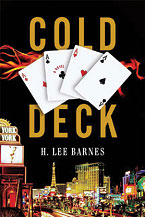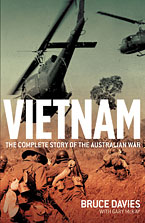 |
|||||||||
|
Books in Review, July/August 2013 The Latest From H. Lee Barnes: REVIEWS BY MARC LEEPSON
Barnes—who will receive the VVA Excellence in the Arts Award at the National Convention in Jacksonville—cemented his literary credentials for me in 2007 with Minimal Damage, another stellar group of short fiction pieces. In this case Barnes offered up six short stories and one novella, each centering on an American war veteran. Three of the main characters, including the protagonist of the gripping novella Snake Boy, are Vietnam War or era veterans. Private, which takes place at Basic Training at Fort Polk, shines fresh light on all the crazy-DI tales you’ve heard or experienced. Two years ago Barnes published When We Walked Above the Clouds, his Vietnam War memoir, another superbly written, compelling book. This time Barnes showed off his nonfiction writing talents as he examined his time as a Special Forces A Team sergeant based in Tra Bong working mainly with the Montagnards. It often is not the prettiest of pictures. But it is an indelible one, a “truthful examination,” as Barnes puts it. H. Lee Barnes’s latest book, Cold Deck (University of Nevada Press, 201 pp., $26.95), is a fast-reading thriller that has nothing whatsoever to do with the war in Vietnam or its veterans. The protagonist, Jude Helms, is a low-level Las Vegas casino dealer who is scarred psychologically by his narrow escape from death during the infamous MGM Grand fire in 1980 that killed dozens of people. More than two decades later he gets trapped into taking part in a dangerous casino scam with a set of bad actors that threatens his well-being and that of his children. The dialogue-driven plot hums along rapidly as Helms begins to unravel. In the end—well, that would spoil things. Suffice it to say that Barnes has crafted a worthy thriller to go along with his sterling short fiction and stellar war memoir.
Philip Napoli teaches U.S. history at Brooklyn College, where he also directs the Vietnam Oral History Project. In his first-rate new book, Bringing It All Back Home: An Oral History of New York City’s Vietnam Veterans (Hill and Wang, 272 pp., $27), Napoli uses what he calls the “life-story” technique to good effect. In a nutshell, this oral history technique consists of Napoli’s chapter-length essays wrapped around the first-person life stories of his subjects. The book, to its credit, therefore reads more like a series of well-done biographical sketches fleshed out with bigger-picture insights rather than the standard oral history formula of page after page of first-person testimony. Beginning in 2004 Napoli—who teaches a Vietnam War class—spent some six years conducting extensive interviews with more than two hundred Vietnam veterans who either grew up or live in New York City. He has boiled down the resulting six hundred hours of recordings to a readable narrative that uses the life stories of the veterans to tell the human story of the American war in Vietnam. Three of the veterans whose life stories are told in the book—Sue O’Neill, Bernie Edelman, and Joan Furey—have earned national reputations for their writings about the Vietnam War and its veterans. O’Neill, the author of Don’t Mean Nothing, an acclaimed book of short stories, served as a nurse in the war. Former Army journalist Edelman is best known for putting together the great Vietnam veterans oral history, Dear America. Furey, who also served in the Army Nurse Corps, co-edited (with Lynda Van Devanter) Visions of War, Dreams of Peace, a pioneering collection of poetry by women Vietnam veterans. Several other long-time VVA members are profiled in the book. The book takes pains to present more than just war stories. We get accounts of the lives of the veterans before they went to the war and after they returned home. While some of the veterans’ stories are New York City specific, the bulk of them mirror the experiences of Vietnam veterans from across the nation. The book is a welcome addition to the Vietnam War oral history literary canon.
You can find out more than you ever wanted to know about Australia’s Vietnam War experience in Vietnam: The Complete Story of the Australian War (Trafalgar Square, 704 pp., $49.95), a massive, well-written, and well-researched volume by Bruce Davies and Gary McKay, Australian Army veterans who have written extensively about the Australian war in Vietnam. The authors do a fine job of setting out virtually the entire story of Australia’s participation in the war in this long, detailed book. Published in 2012 in Australia, the book tells the story of the American war from the beginning to the end and does so with a very strong Australian accent. Although they cover virtually all of the war’s important military, political, and geopolitical aspects, Davies and McKay concentrate on ground combat. They provide details of dozens of engagements, large and small, and always bring the discussion back to Australian participation. The number of Aussie troops in Vietnam peaked at around eight thousand in 1969. By 1971 all of them had returned home. Some five hundred Australian troops died in the war; nearly three thousand were wounded. The war was controversial in Australia, with a growing antiwar movement that paralleled the one in America. This worthy book fills a void in Vietnam War scholarship, at least in this country.
Beverly Deepe Keever spent more than seven years as a magazine and newspaper correspondent covering the war in Vietnam. She arrived in 1962 at age twenty-six as a free-lance reporter after having received her MA in journalism from Columbia Journalism School. She left in 1969 after writing countless articles, mainly for Newsweek, the Christian Science Monitor, and the New York Herald Tribune. In her new memoir, Death Zones and Darling Spies: Seven Years of Vietnam War Reporting (University of Nebraska Press, 360 pp., $26.95), Keever does an excellent job of recounting her unique Vietnam War experiences. The book, she notes, is “more than just my re-reporting of the Vietnam War or my instant replay of the history that I witnessed.” Keever fills out what she experienced with information that she couldn’t write about at the time, mainly from secret government documents about the war that later surfaced in The Pentagon Papers.
|
|||||||||
8719 Colesville Road, Suite 100, Silver Spring. MD 20910 | www.vva.org | contact us |
|||||||||










